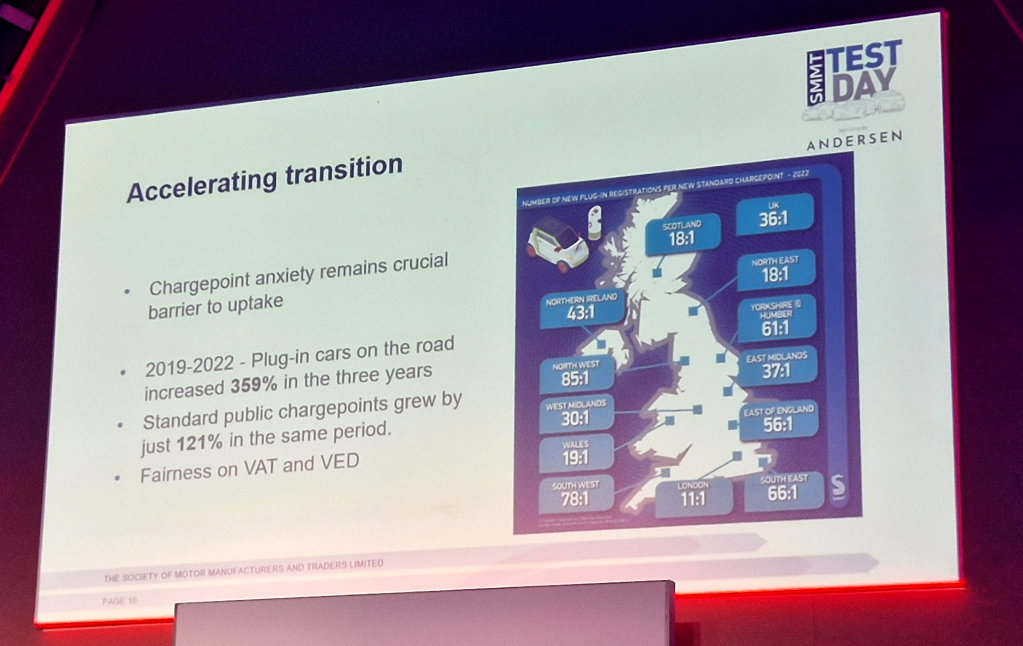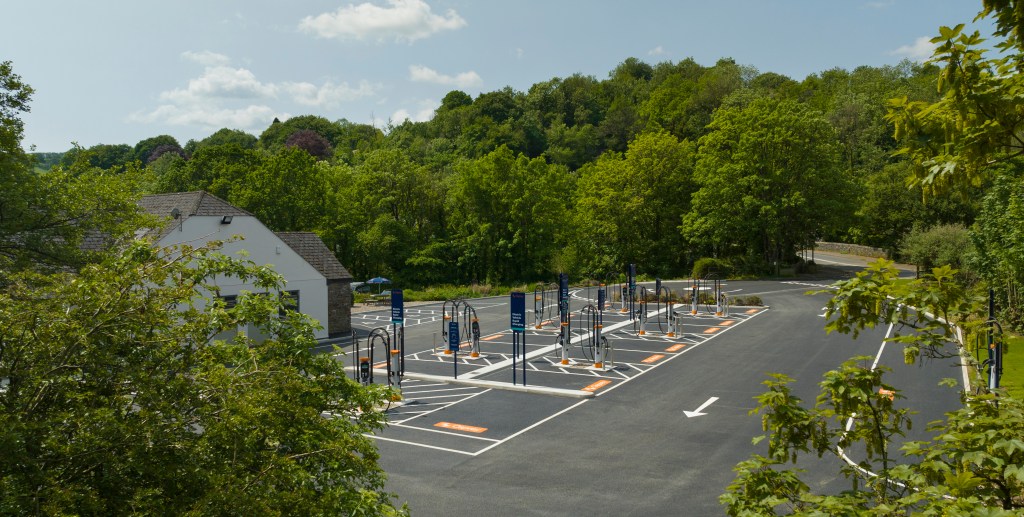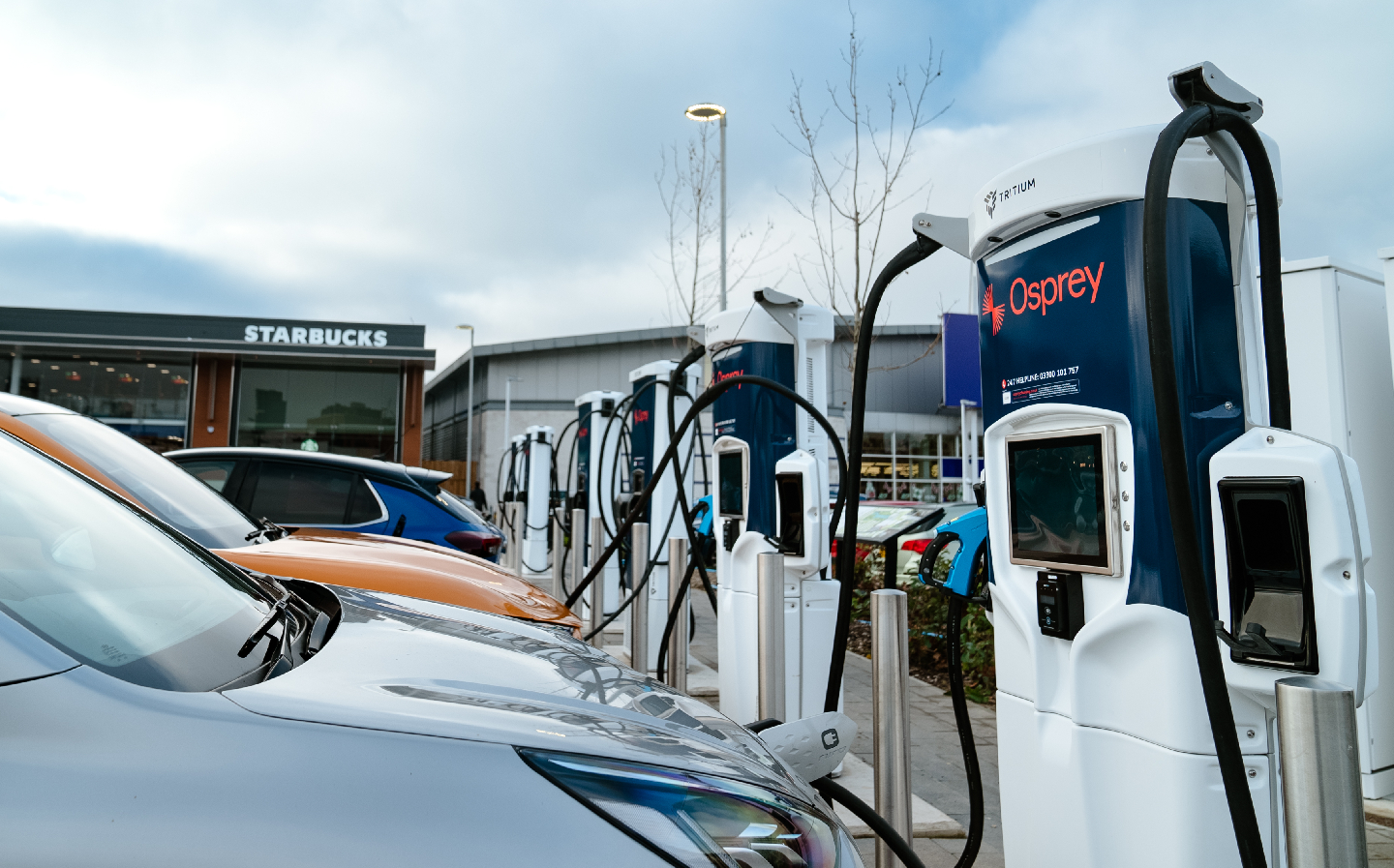Electric vehicle to charger figures ‘completely misleading’, says trade body
Public charger deployment has 'never been higher'
Figures showing the number of new plug-in cars outstripping new electric vehicle charging points by three to one over last three years have been described as “completely misleading” by the UK’s leading charging point trade body.
The data, presented to hundreds of automotive media at an event staged by the Society of Motor Manufacturers and Traders (SMMT) last week, showed that the number of plug-in cars on the road increased by 359 per cent between 2019 and 2022, whereas the number of public charging points has only increased by 121 per cent over the same period.
In its reporting, The Times said this represented a growing gulf, and that some parts of the country had seen a doubling of cars to public chargers.
The paper noted that in the northwest of England there were 85 EVs to every charger by the end of 2022, compared with 49 in 2021, while the ratio had risen from 44:1 to 78:1 in the southwest. Meanwhile London was described as the best-served region, at 11:1 compared with 10:1 in 2021.

The Times added that “electric car drivers faced long queues at charging stations over the bank holiday weekend, in a repeat of chaos over Christmas,” during which some EV drivers faced long queues to recharge at motorway services during peak times.
Following publication of the story, SMMT Chief Executive Mike Hawes told Times Radio: “The government is compelling the industry to sell more of these battery electric vehicles — in fact, we’ve got a [Zero Emission Vehicle] mandate that will kick in from next year, starting at 22 per cent of all new car sales must be EVs, rising to 80 per cent of new car sales and vans by 2030.
“Now we hear about the investment that’s going into infrastructure, but it’s behind the curve. We know investment announcements are great. What drivers want to see, is that charge points are working, and working reliably.”
However, Ian Johnston, chair of ChargeUK and CEO of the Osprey Charging Network, which operates more than 600 rapid charging stations in the UK, said that highlighting the ratio of EVs to public chargers was “completely misleading” and “ignores the fact that the majority of EV charging takes place at home or at the workplace”, with no inclusion of such private chargers in the figures.
An annual survey of EV drivers by Zap Map, the UK’s leading charging point data provider, showed that last year, 84 per cent of respondents had access to a home charger.

Johnston (pictured) acknowledged that this figure will reduce over the coming years, as more drivers without access to off-street charging find their way into electric cars.
But he pointed out that the rate of public charger deployment has “never been higher”. According to figures published by ChargeUK on May 18, the average number of new chargers installed per month in the first four months of the year increased by 75 per cent compared to the same period in 2022, with more than 2,000 new units installed in both March and April.
Zap Map’s latest figures show that there are now 42,566 public chargers available in 24,909 locations around the UK. It states that between the end of 2021 to end of 2022, more than 8,600 charge points were added to the UK network, an increase of 30 per cent in 12 months. Nearly a fifth (18.6 per cent) of those currently installed are either rapid or ultra-rapid chargers, offering upwards of 25kW of power, and 2,869 of those offer charges at more than 100kW.
Speaking on Times Radio on Wednesday, Mel Stride, the Secretary of State for Work and Pensions, agreed that prospective EV buyers need not panic.
“If you look at [motorway] service station forecourts, 97 per cent of them have electric charging facilities [and] you’re never more than 25 miles away from a charging point on the motorway,” he said.
“And we’ve made the recent announcement for local authorities: £400 million there, so that they can put their shoulder to the wheel.”
Stride added that the government is working with the private sector to ensure installers, such as the members of ChargeUK, can better deploy their new charging points.

“Everyone is aligned in wanting more public charging, and wanting it now,” Johnston told Driving.co.uk. “The founding members of ChargeUK have publicly committed over £6bn of private investment into public charging between now and 2030. Between us, we have sufficient projects in development today to already double existing size of the UK’s charging infrastructure.”
He said part of the work with government and local authorities is removing the barriers that are preventing his members from deploying charging infrastructure quicker. These include the grid connection process, the planning process and highways permits.
3. We don’t need an equal geographical spread of chargers, we need them most where people have less access to off-street parking
— Ian Johnston (@osprey_ian) May 31, 2023
4. We ALL want more chargers – we are working with @OZEVgovuk to deploy even more chargers even faster @OspreyCharging @ChargeUK_
He added that ChargeUK is engaged with the government on how to increase the pace of roll out in critical areas, including at motorway service areas, and on local authority residential streets and car parks.
The concern for those in the EV industry is that the suggestion there are not enough EV chargers to meet demand, and that the pace of installation is slowing, will deter people from switching to electric vehicles and push back climate goals.
“It is imperative that the Government does not soften the ZEV mandate targets and requirements, to ensure that the UK remains a leader in the journey towards achieving Net Zero,” he said.
Follow @wdron Tweet to @wdronRelated articles
- If you were interested in the SMMT’s electric vehicle to charger figures being described as ‘completely misleading’ by ChargeUK, you might like to read about the Government’s pledge of £500m to increase number of EV charging points tenfold by 2030
- Renault to launch 400kW ultra-rapid charging hubs and new EVs through Mobilize sub-brand
- EV tips: 10 things to know before you buy an electric vehicle
Latest articles
- Five best electric cars to buy in 2025
- Should I buy a diesel car in 2025?
- F1 2025 calendar and race reports: The new Formula One season as it happens
- Zeekr 7X AWD 2025 review: A fast, spacious and high tech premium SUV — but someone call the chassis chief
- Denza Z9GT 2025 review: Flawed but sleek 1,062bhp shooting brake from BYD’s luxury arm
- Extended test: 2024 Renault Scenic E-Tech review
- Best-selling cars 2025: The UK’s ten most popular models of the year so far
- Audi A6 Avant 2025 review: Trusty executive estate ticks expected boxes, and there’s still a diesel option
- Keir Starmer eases pressure on carmakers to sell EVs in response to ‘global economic headwinds’














